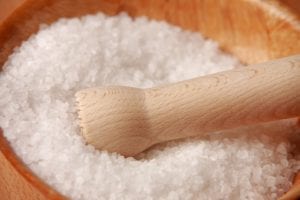
Slow Poison
Salt is an integral component of the daily diet of man. We consume it in large quantities, without noticing it, because it hides in the most unexpected products. At the same time, the daily salt norm should not exceed 10-12 g, including salt contained in consumed food. Salt makes fresh food tastier. And this, perhaps, is the only reason why we feel an ineradicable craving for it.
Meanwhile, an excess of salt, more precisely the sodium present in it, keeps the excess liquid in the body for a long time. As a result, the burden on the kidneys and heart is multiply increased, blood pressure rises and hypertension gradually develops. Under the influence of salt, cholesterol splitting slows down, which can lead to atherosclerosis and other dangerous diseases of the cardiovascular system. Another unpleasant surprise is the extra weight in addition with swollen feet, swollen abdomen and not rarely cellulite. And all this is due to excess salt in the body. From this point of view, the benefits of a salt-free diet are obvious. It helps to lower the level of salt in the blood and normalize the work of all body systems. What are the principles behind this power system?
Denial of benefit
A salt-free diet is recommended primarily for people with kidney disease, high blood pressure, frequent swelling and excessively overweight
A salt-free diet presupposes a rejection not only of table salt as such, but of any sodium compounds found in different foods. The forbidden list primarily includes sausages and smoked products, home marinades and pickles, canned food, fried foods, cereals, flour and confectionery. At the same time, the question arises correctly: what can you eat in this case? A salt-free diet allows you to use lean varieties of meat and fish in combination with vegetables without salt, with the exception of potatoes. You can supplement the dishes with rye bread, while not exceeding the daily norm of 200 g. Be sure to enter into the diet light soups on fish or vegetable broth. Very useful eggs will be in moderation and dairy products with reduced fat content. As a dessert, you can eat any fruit and berries. In this case, you need to eat small portions five to six times a day, drink at least two liters of boiled water. Following these principles, in the first week you can lose a few pounds. That’s why a salt-free diet for weight loss is a very effective weapon. Among other things, it helps to establish exchange processes and properly build a healthy food system.
Be that as it may, physicians pay attention to the fact that the salt-free diet has a curative character. It is recommended primarily to people with kidney disease, high blood pressure, frequent swelling and excessively overweight. In all other cases, a full and prolonged refusal of salt can provoke serious complications.
Reasonable balance
It is important to remember that lack of salt is as dangerous as its excess
If we talk about reducing body weight, then the results of a salt-free diet can very soon come to naught. Because the weight goes away from the liquid, excess kilograms are returned with “friends“ as soon as salt reappears in the diet. It is important to remember that lack of salt is as dangerous as its excess. Sodium is a vital element, regulates the level of beneficial acids and water balance in the body. Violation of balance is fraught with a sharp deterioration of well-being, and in especially neglected cases – death. Very often a lack of sodium causes the development of a heart attack or stroke. That’s how dangerous the salt-free diet is.
To avoid fatal consequences, doctors recommend not to abuse this food system and limit it by the time two weeks. In the future, you can reduce the salt content by other methods. For example, to replace fine-grained salt with ordinary cookery, or even better, marine. The sodium level in it is much lower, but potassium, magnesium and bromine in it is abundant. Try not to reseed the dishes during cooking, adding salt at the very end. Refuse uniquely harmful products: semi-finished products, meat delicacies of factory production, store canned food, salted fish. Such an optimal compromise will help to reduce the harm of a salt-free diet to zero.
A salt-free diet, like any other, requires a balanced approach and thorough consultation of the doctor. Only in this case it will be useful for the organism and will achieve the desired results.
In fact, a person can die from three spoons of salt?
In fact, yes, especially if it’s a small person. If you eat a lot of salt in one sitting, the sodium level in all tissues and biological fluids will very quickly rise. This condition is called hypernatremia and leads to dehydration of cells, including cells of the nervous system. Cells may die, or their function may be compromised. The normal level of sodium in the blood is 140 units, a level above 180 units often leads to death. Such a small amount of salt, like 9g, can increase the level of salt in the blood by 10 units, accordingly 3 tablespoons of salt (45 g) can increase the salt level by 50 units. In the absence of emergency medical care, you can die from fewer. Loss of consciousness, cramps and the need for resuscitation are virtually guaranteed. In Virginia a couple of years ago, a young man on a dispute drank a glass of soy sauce that contains a large amount of salt: survived, but with difficulty (sciencedirect.com). And in Japan, there were a few suicides when soy sauce was taken as poison (sciencedirect.com or sciencedirect.com). Death in this case comes precisely from hypernatremia.
Image credit: andreas160578
